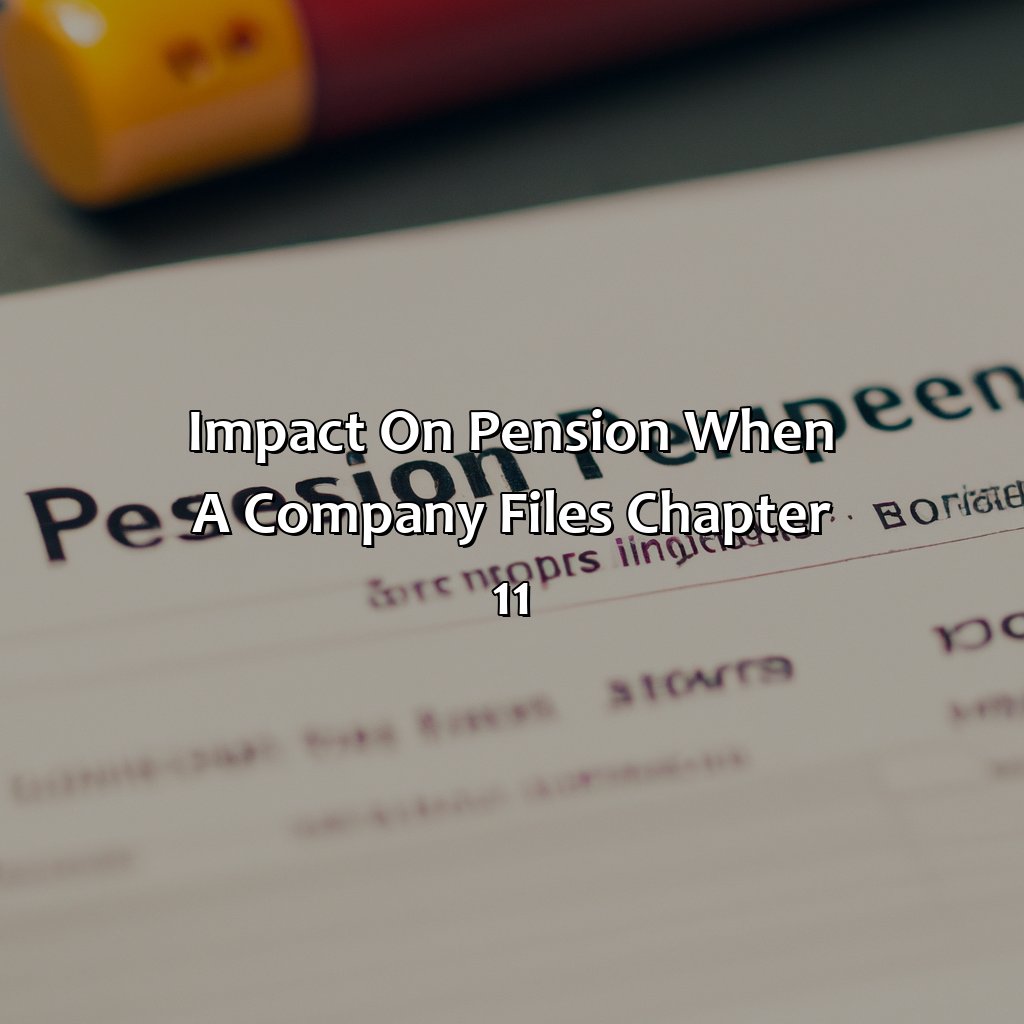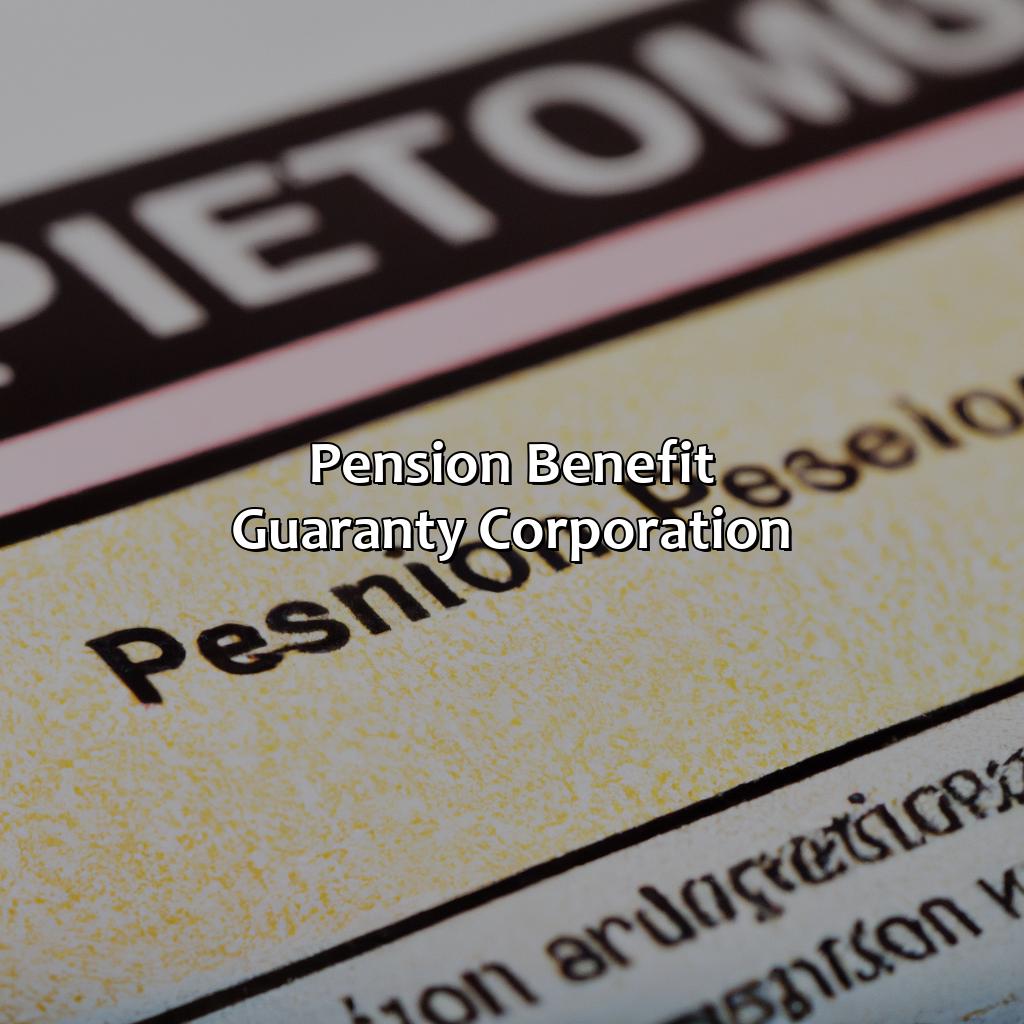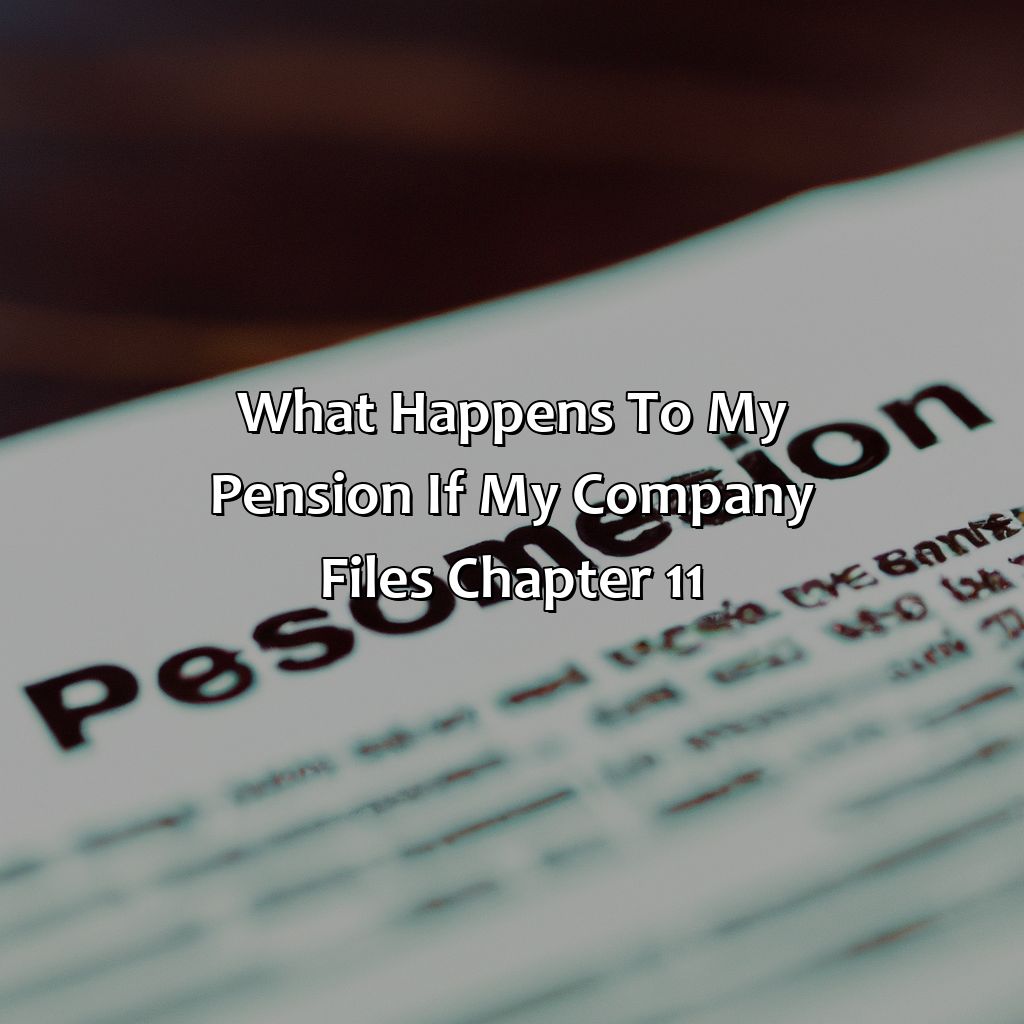What Happens To My Pension If My Company Files Chapter 11?
Key Takeaway:
- When a company files for Chapter 11 bankruptcy, it can impact the pension plan of its employees. This is because the company is allowed to reduce or terminate its contributions to the plan, leaving employees with potentially reduced benefits.
- The Pension Benefit Guaranty Corporation (PBGC) is a government agency that protects pensions in case of bankruptcy. However, it has certain limitations and may not cover the full amount of an employee’s pension.
- Pension plan participants have several options when their company files for Chapter 11. They can participate in the reorganization plan, roll over their pension into an IRA or other retirement account, or receive a lump sum payment.
With the number of companies filing Chapter 11 bankruptcy skyrocketing, many are left wondering what will happen to their hard-earned retirement savings. You may be asking yourself, what happens to my pension if my company files Chapter 11? Here we provide some answers.
Impact on pension when a company files chapter 11
Do you know how a Chapter 11 bankruptcy impacts your pension plan? We can help explain it! We have a section on the “Impact on Pension when a Company Files Chapter 11“. This section will help you understand. There are two sub-sections – “Definition of Chapter 11 Bankruptcy” and “Effect of Chapter 11 on Pension Plans“. These provide a brief overview of the topics.

Image credits: retiregenz.com by Adam Arnold
Definition of chapter 11 bankruptcy
Chapter 11 bankruptcy is a legal process in which a company reorganizes its debts and operations under court supervision. This allows the company to continue its business while it develops and implements a plan to repay its creditors over time. Chapter 11 bankruptcy is commonly used by large or complex businesses that need to restructure their finances, but it can also be used by small businesses or even individuals.
If your company files for Chapter 11 bankruptcy, your pension may be affected. Generally, pension plans are considered separate entities from the employer and are not directly impacted by bankruptcy proceedings. However, if your employer is unable to fund the pension plan due to financial difficulties, the Pension Benefit Guaranty Corporation (PBGC) may step in to help. The PBGC is a government agency that protects certain pension benefits in the event of an employer’s bankruptcy.
It’s important to note that not all types of pensions are covered by PBGC insurance, so it’s essential to understand what kind of plan you have and what benefits might be available if your employer goes bankrupt. Additionally, even if your plan is insured by PBGC, there may be limitations on the amount of benefits that are covered.
Pro Tip: If you’re concerned about how your pension might be affected by your employer’s financial problems, speak with a financial advisor or attorney who specializes in pensions and bankruptcy. They can help you understand your rights and options and guide you through any necessary steps to protect your retirement savings.
Looks like my retirement plan is going bankrupt along with my company.
Effect of chapter 11 on pension plans
When a company files for chapter 11, it can have an impact on pension plans. As per regulatory requirements, the company has to fund the pension plan adequately before filing. However, if the company is unable to fund the plan entirely or ceases operations, then the Pension Benefit Guaranty Corporation (PBGC) takes over the pension plan. PBGC provides funds up to a certain limit that varies based on factors such as age and length of service. The PBGC may also reduce benefits further if they exceed the set limits. It is essential to note that only defined benefit plans are eligible for PBGC protection and not 401(k) or other defined contribution plans. Also, changes in a pension plan during financial struggles could result in bankruptcy court intervention or employee lawsuits.
Notably, American Airlines filed for bankruptcy in 2011 due to mounting debt going up against competitors with lower operating costs. Nearly 130k American Airlines employees were impacted by this development, and their pensions were at stake of being reduced by an average of $10K to $12K per year despite investing significant time and money into their retirement savings with promises of guaranteed security upon retirement. This incident highlights how influential these situations can become for employees who fall victim to them unexpectedly. If you are worried about what happens when a company terminates a pension plan, it’s important to educate yourself on the options available and seek professional advice to secure your retirement funds.
Don’t worry, the Pension Benefit Guaranty Corporation has got your back…until they don’t.
Pension Benefit Guaranty Corporation
Know the role of Pension Benefit Guaranty Corporation (PBGC) in case your company files for Chapter 11 bankruptcy. Learn how PBGC helps protect your pension. It has limits and coverage. Discover more about it here.

Image credits: retiregenz.com by David Woodhock
Role of PBGC in protecting pensions
The Pension Benefit Guaranty Corporation (PBGC) plays a vital role in safeguarding the retirement benefits of employees when their employers file for bankruptcy. PBGC protects pensions sponsored by private-sector companies that are covered under the Employee Retirement Income Security Act (ERISA). In such cases, PBGC takes over the pension plans and pays the promised benefits, up to a certain limit. This ensures that workers receive their pension payments regularly, even if their employer goes bankrupt.
PBGC protects defined benefit pension plans of private sector companies in case of financial distress or insolvency. The PBGC guarantees a portion of the promised benefits such as early retirement benefits, disability benefits, survivor annuities and other types of pensions. However, not all corporations qualify for PBGC protection, so it’s essential to verify whether your employer is entitled to this protection.
It’s important to note that while PBGC provides some protection against losing your pension plan, it does not guarantee all pension payments. The maximum payout amount varies based on age and other factors but has limits set by law. Therefore, It’s advisable to do an independent investigation of your employer’s health and stability and make personal financial arrangements. You can read more about which factors decrease a pension plan assets to understand the risks involved.
A fact reported by Forbes indicates that despite the protection provided by PBGC, several major corporations with moneyed pensions ultimately terminated those programs on their own or left liability partially unfunded due to rising insurance premiums and uncertainty about taxes on gains from Plan assets.
If you are curious to know more about which of the following is true of pension termination, you can visit our website for more information.
PBGC’s coverage limits remind me of my ex’s love-never enough to fully support me.
Limits and coverage of PBGC
The Pension Benefit Guaranty Corporation (PBGC) offers insurance coverage to private sector pension plans. In case the company goes bankrupt or is unable to fund its retirement plan, PBGC may intervene and pay pension benefits up to a certain limit. The coverage limit varies depending on the type of pension plan and age of participants. PBGC does not cover all types of benefits, such as early retirement benefits, that some workers may be entitled to from their plan.
Moreover, PBGC coverage comes with certain limits regarding payments. For single-employer plans taken over by PBGC in 2020, the maximum annual benefit for those retiring at age 65 is $68,236 while for multi-employer plans, it is $12,870 per year. Additionally, benefits paid by PBGC may be lower than what employees expect from their pension plan. Moreover, the corporation is prohibited from covering retiree health care or other non-pension benefits linked with the employer’s promise.
Interestingly historically in April 1985 Continental Airlines filed for Chapter 11 bankruptcy but emerges without being liquidated (terminated).It was followed by United Airlines who also filed for chapter 11 in December 2002. However, similarly emerged unliquidated when a federal loan guarantee program backed its loans. In both cases, despite high concerns about employees’ pensions, they got saved through restructuring. Although even under these conditions, PBGC plays an agency role if a takeover of participant’s pensions gets restricted or hindered by any reason. Limitations still shall apply!
Planning for retirement just got even more exciting – the Pension Benefit Guaranty Corporation has got your back, but just in case, let’s explore our options.
Options for pension plan participants
Company Chapter 11? Jump into sub-sections for pension participants! Options include:
- Partaking in the reorganization plan.
- Rolling over the pension into an IRA or other retirement account.
- Receiving a lump sum payment.

Image credits: retiregenz.com by David Washington
Participate in the reorganization plan
When a company files for Chapter 11, pension plan participants may be worried about the impact on their retirement funds. To participate in the reorganization plan, contact the bankruptcy court-appointed trustee to discuss your options. You may also want to review your pension plan’s summary plan description and consult with a financial advisor to make an informed decision. Keep in mind that your choices could affect your future benefits.
It is important to understand that participating in the reorganization plan does not guarantee funding for your pension plan. However, it could give you a chance to voice your concerns and potentially negotiate better terms for yourself and other participants.
Furthermore, if you decide not to participate in the reorganization plan or do not have enough information to make a decision before the deadline, your claim may be chose-in or close-out based on the court’s decision. Have you ever wondered what happens to a pension when you die?
In a similar scenario, employees of United Airlines faced uncertainty when their employer filed for Chapter 11 bankruptcy protection. Under the reorganization plan, pension benefits were reduced by up to 50%, leaving many employees with lower-than-expected retirement savings.
Rollin’, rollin’, rollin’ – keep that pension safe and roll it over into an IRA or other retirement account!
Roll over the pension into an IRA or other retirement account
When a company files for Chapter 11 bankruptcy, it can be challenging for the employees to be certain of their pension plan futures. One option available to them is to transfer their pension into an IRA or other retirement account. Here are four points that expound on this option:
- The process should start with contacting the pension plan administrator to seek clarification on how to go about transferring pension funds under such circumstances.
- Some considerations a participant needs to make include comparing fees and commissions charged by different investment firms offering IRAs, including custodial fees and fiduciary standards.
- Rolling over the pension guarantees the investor better control over their funds, including specific investment vehicles they may want to explore to improve returns on investments.
- Withdrawing money from a 401(k) directly or in cash incurs early withdrawal costs, income taxes, and penalties. Rolling over allows investors sidestep these expenses and stay focused on growing their retirement nest eggs.
It’s essential for individuals considering this option not to rush into it without understanding any legal ramifications that could arise from such transfers. Taking appropriate steps will ensure that they get maximum benefits out of their pension plans while continuing on the path towards financial freedom. Lastly, we heard of John who successfully rolled over his pension into an individual retirement account and saw growth in his funds within two years. Why wait for retirement when you can get a lump sum now and spend it all on therapy for the trauma caused by your bankrupt employer?
Receive a lump sum payment
If you’re considering a payout option for your pension plan, receiving a lump sum payment may be an option. This means you’ll receive the entire amount of your pension in one payment, but usually at a discount. Be aware that this payment will be taxable and could affect any government benefits you receive.
Keep in mind that choosing this option can have long-term financial consequences and there may be alternative options that are more suitable for your financial situation. Consider speaking with a financial advisor before making any decisions.
It’s important to note that when you leave a company, what happens to your pension may vary depending on the rules of your specific pension plan and the circumstances surrounding your company’s bankruptcy filing. Lump-sum payouts may not always be available.
Reports suggest that participants in underfunded defined benefit plans typically only get around 40 to 60 cents on the dollar when their company files for Chapter 11 bankruptcy protection.
Some Facts About What Happens to My Pension If My Company Files Chapter 11:
- ✅ Your pension may be protected by the Pension Benefit Guaranty Corporation (PBGC) if your company has a pension plan insured by PBGC. (Source: PBGC)
- ✅ If your pension plan is not insured by PBGC, your retirement benefits may be at risk in a company bankruptcy. (Source: Kiplinger)
- ✅ Pension plans are usually considered unsecured creditors in bankruptcy, and may receive less than full payment if the company’s assets are insufficient to cover all debts. (Source: Investopedia)
- ✅ Your pension benefits may be affected if your company decides to terminate its pension plan as part of its reorganization in bankruptcy. (Source: AARP)
- ✅ It is important to stay informed and seek professional advice to understand how a company’s bankruptcy may impact your pension benefits. (Source: U.S. Department of Labor)
FAQs about What Happens To My Pension If My Company Files Chapter 11?
What happens to my pension if my company files chapter 11?
If your company files for chapter 11 bankruptcy, your pension is protected by the federal government’s Pension Benefit Guaranty Corporation (PBGC). However, the amount of your pension may be reduced, so it’s important to stay informed and understand your rights.
What is the Pension Benefit Guaranty Corporation (PBGC)?
The Pension Benefit Guaranty Corporation (PBGC) is a federal agency that insures private defined benefit pension plans in case of bankruptcy. If your company’s pension plan is terminated because of bankruptcy and doesn’t have enough money to pay its pension obligations, the PBGC steps in to pay benefits to retirees.
How much of my pension will the PBGC pay?
The PBGC has a maximum guarantee limit that varies depending on your age and the year your company’s pension plan was terminated. For 2021, the maximum guarantee limit for a 65-year-old retiree is $6,034.09 per month, or $72,409.08 per year.
Will I receive my full pension amount if my company files chapter 11?
If your company files chapter 11 bankruptcy, it’s possible that your pension may be reduced. This is because the PBGC may not have enough money to pay your full benefit amount. However, the PBGC will pay as much of your pension as it can, up to the maximum guarantee limit.
Do all types of pension plans receive PBGC protection?
No, not all types of pension plans are covered by the PBGC. The PBGC only protects private defined benefit pension plans, which promise a specific monthly benefit at retirement based on factors such as years of service and salary. Defined contribution plans, like 401(k) plans, are not covered by the PBGC.
What should I do if my company files chapter 11?
If your company files chapter 11 bankruptcy, it’s important to stay informed and understand your rights as a retiree. You should contact your pension plan administrator and the PBGC to find out how your benefits will be affected. You may also want to seek advice from a financial advisor or a lawyer who specializes in pensions and bankruptcy.


